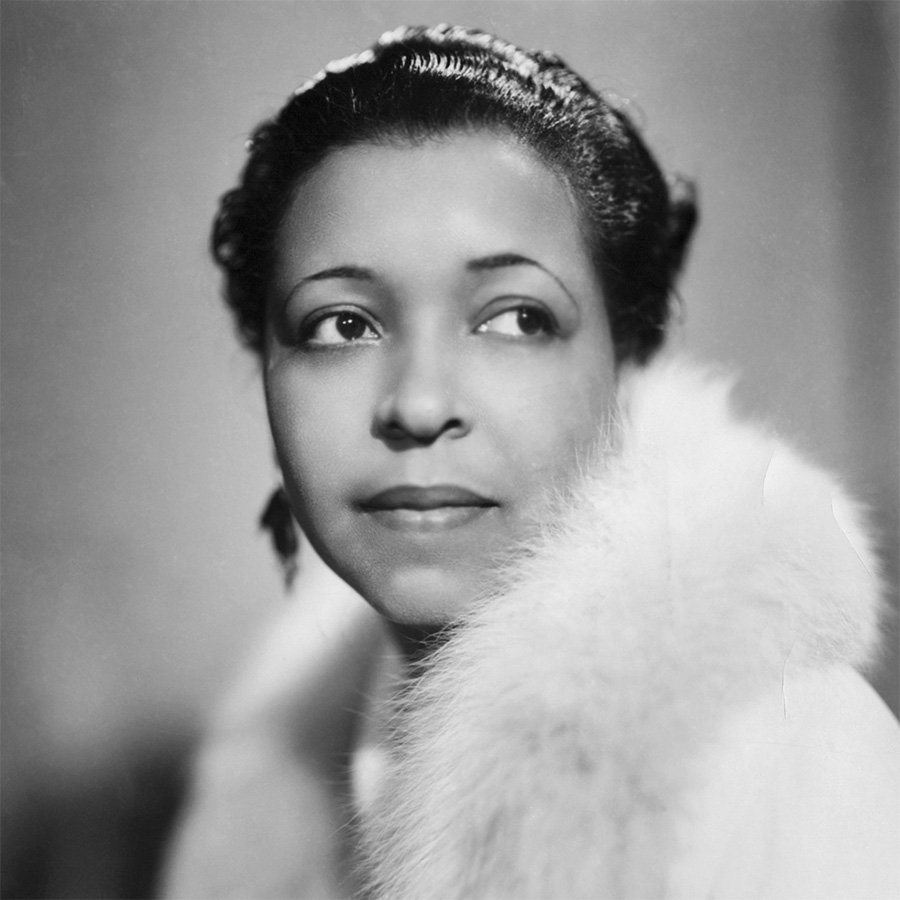Media August Wilson + Fences
A look at innovative African American playwright, August Wilson, his cycle of 10 plays, and his critically-acclaimed family drama, Fences.
Born
October 31, 1896
Died
September 1, 1977
Country
United States of America
Known as “Sweet Mama Stringbean” for her slender figure, Ethel Waters could sing the blues beyond compare. Her soft, refined voice, theatrical style, and signature shimmy captivated Black and white audiences alike.
Waters grew up in the chaotic misery of a Philadelphia slum. “No one raised me,” she recalled. “I just ran wild.” Waters gladly put it all behind her to tour on the vaudeville circuit. She ended up in New York City, performing on the stages of both the Lincoln and Lafayette Theatres.
In 1919, she became one of the first Black artists hired by Black Swan Records. The commercial success of two 1921 recordings—“Down Home Blues” and “Oh, Daddy”—landed Waters a touring gig with Fletcher Henderson and the Black Swan Troubadours.
 |
The Music of
|
Her recording career was heating up, but Waters refused to let her theater work cool down. In 1927, she made her Broadway debut in Africana. Her rendition of Harold Arlen’s “Stormy Weather” at the Cotton Club in 1933 (he had written the song expressly for her) moved composer Irving Berlin to cast Waters in the musical comedy As Thousands Cheer. When the show toured the South, she snared top billing alongside her white cast members—a first for any Black actress.
Waters’ stage credits eventually surpassed those she had notched as a singer. Her numerous Broadway hits included At Home Abroad (1936), Mamba's Daughters (1939), Cabin in the Sky (1940), and Member of the Wedding (1950).
Waters effected a mid-career makeover as a dramatic screen actress, appearing in nine feature films. In 1949, her turn as Granny in Pinky earned her an Oscar® nomination for Best Supporting Actress.
 I n t e r s e c t i o n s |
|
 |
Waters performed in Hello, 1919 at the Lafayette Theatre. |
 |
She toured with Fletcher Henderson. |
 |
She performed at the Cotton Club. |
 |
She sang with stride pianist James P. Johnson. |
Video Bio
A look at innovative African American playwright, August Wilson, his cycle of 10 plays, and his critically-acclaimed family drama, Fences.
Learn about musical theater using examples from Broadway, the history, structure and elements of musical theater, musical theater's role in social commentary, its legacy, and how you too can create a musical.
As part of The Kennedy Center's 2008 August Wilson's 20th Century festival, this discussion examines the value and impact of the work of playwright August Wilson.
Host Jack Carr, actor Ruby Dee, director Ricardo Khan, and lighting designer Jackie Manassee discuss the collaborative process to bring Pearl Cleage's play Flyin' West to the stage.
Eric Friedman
Director, Digital Learning
Kenny Neal
Manager, Digital Education Resources
Tiffany A. Bryant
Manager, Operations and Audience Engagement
Joanna McKee
Program Coordinator, Digital Learning
JoDee Scissors
Content Specialist, Digital Learning
Generous support for educational programs at the Kennedy Center is provided by the U.S. Department of Education. The content of these programs may have been developed under a grant from the U.S. Department of Education but does not necessarily represent the policy of the U.S. Department of Education. You should not assume endorsement by the federal government.
Gifts and grants to educational programs at the Kennedy Center are provided by A. James & Alice B. Clark Foundation; Annenberg Foundation; the Andrew W. Mellon Foundation; Bank of America; Bender Foundation, Inc.; Carter and Melissa Cafritz Trust; Carnegie Corporation of New York; DC Commission on the Arts and Humanities; Estée Lauder; Exelon; Flocabulary; Harman Family Foundation; The Hearst Foundations; the Herb Alpert Foundation; the Howard and Geraldine Polinger Family Foundation; William R. Kenan, Jr. Charitable Trust; the Kimsey Endowment; The King-White Family Foundation and Dr. J. Douglas White; Laird Norton Family Foundation; Little Kids Rock; Lois and Richard England Family Foundation; Dr. Gary Mather and Ms. Christina Co Mather; Dr. Gerald and Paula McNichols Foundation; The Morningstar Foundation;
The Morris and Gwendolyn Cafritz Foundation; Music Theatre International; Myra and Leura Younker Endowment Fund; the National Endowment for the Arts; Newman’s Own Foundation; Nordstrom; Park Foundation, Inc.; Paul M. Angell Family Foundation; The Irene Pollin Audience Development and Community Engagement Initiatives; Prince Charitable Trusts; Soundtrap; The Harold and Mimi Steinberg Charitable Trust; Rosemary Kennedy Education Fund; The Embassy of the United Arab Emirates; UnitedHealth Group; The Victory Foundation; The Volgenau Foundation; Volkswagen Group of America; Dennis & Phyllis Washington; and Wells Fargo. Additional support is provided by the National Committee for the Performing Arts.
Social perspectives and language used to describe diverse cultures, identities, experiences, and historical context or significance may have changed since this resource was produced. Kennedy Center Education is committed to reviewing and updating our content to address these changes. If you have specific feedback, recommendations, or concerns, please contact us at [email protected].